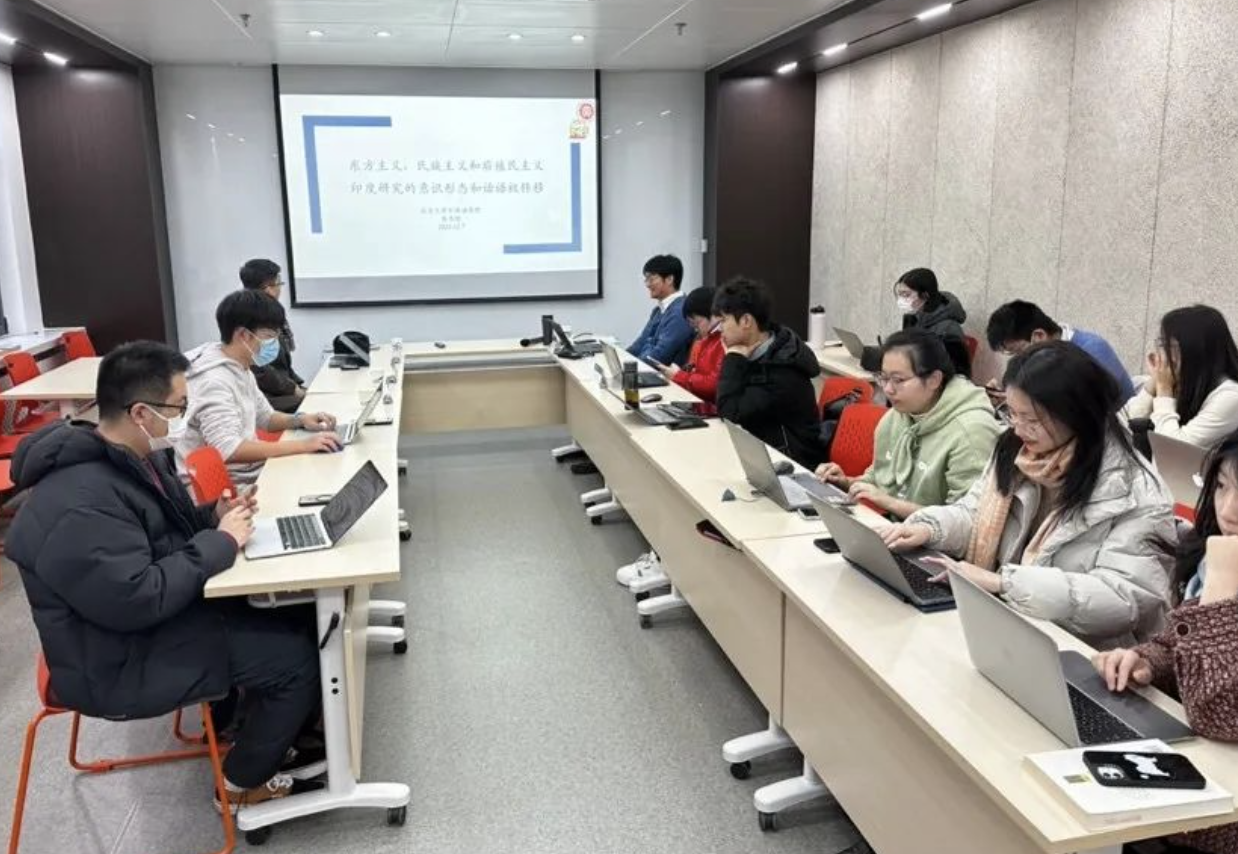
The ninth lecture in the seminar series “Autonomous Knowledge System Construction and New Perspectives in Area Studies,” themed “Orientalism, Nationalism and Post-colonialism: Ideology and Discourse Shift in Indian Studies,” co-hosted by the Institute of Areas Studies, Peking University (PKUIAS) and the Chen Hansheng Center for the Study of World Political Economy (CCPE), kicked off on December 7. This seminar lecture was delivered by Zhang Minyu, assistant professor of the School of Foreign Languages, PKU, and moderated by Zhai Kun, deputy director of PKUIAS, with the participation of Lei Shaohua, associate professor at PKU’s School of International Studies, Yang Meng, assistant professor of PKU’s School of Foreign Languages, and Dong Yu, postdoctoral fellow of PKU’s Department of History, among other teachers and students from different colleges and institutes.
At the beginning of the lecture, Zhang Minyu pointed out that with the development of South Asian studies, various ideas and paradigms have become entangled with each other, resulting in a single linear narrative of the history of the discipline that can no longer adequately show the development of this academic system. South Asian studies in China and the US both benefited from European classical Indology, but gradually moved toward a different disciplinary path in the 1940s. Taking the academic exchanges between Chen Hansheng and Daniel Thorner, two important representatives of the disciplinary history of South Asian Studies in China and the US, as an entry point, Zhang Minyu demonstrated the impact of the global left-wing academic network on the construction of interdisciplinary South Asian studies in China and the US in the 1940s and 1950s through the lens of transnational history.
After American left-wing scholarship was suppressed by McCarthyism in the 1950s, a new generation of scholars represented by Weiner studied Indian politics with behaviorist political science, which not only filled the space left by the retreat of left-wing political economy, but also helped the American study of South Asia to begin to get rid of its intellectual dependence on European Indology. In addition, American scholars’ critique of the imagery of the Indian village in the British colonial knowledge system and their exploration of how to modernize agriculture on the premise of preventing violent revolutions further established a modern knowledge system of South Asian studies with a strong sense of American problems.
The emergence of plebeian studies in the 1980s was initially Marxist. However, it gradually lost its radicalism when it entered the US, generalizing from a critique of the Indian National Congress-led national independence movement and post-independence Indian National Congress politics to a critique of nationalism in a broader sense and the politics of the emerging nation-states. Plebeian studies, integrated with postcolonial criticism, challenged the intellectual authority of Indology in European countries such as Britain and France, and weakened India’s authority over its studies on the country itself, further enhancing the international academic influence of South Asian studies in the US.
In the discussion session, Zhai Kun pointed out that this lecture deeply analyzed how the US escaped from its dependence on European Indology and successfully established itself as the center of the field of South Asian studies. In contrast, India has not only failed to become the center of South Asian studies, but has also consolidated the dominant position of the American intelligentsia due to brain drain and other reasons. The historical experience of the US may provide inspiration for us to explore the development path of area studies with Chinese characteristics. Lei Shaohua extended the knowledge production system of area studies in the US to international relations theory, pointing out that paradigms such as constructivism and realism are also rooted in the academic discourse system based on colonialism or racism. Therefore, it is crucial for China to realize a “self-contained system” in the field of knowledge production, although it still faces great challenges.
Yang Meng expressed her concern about the ethnic distribution of Indian studies researchers and how to conduct cross-country, cross-language and cross-disciplinary South Asian studies. Dong Yu argued that historically, southern Central Asia has had a close relationship with the Indian subcontinent, but the influence of socialism after the October Revolution has led Central Asia to take a very different path of development from India, and there are obvious differences between the two regions in terms of modernization transformation. Participating teachers and students also had a discussion on the perception of nationalism in India and the impact of Indian diplomacy on the academia.


